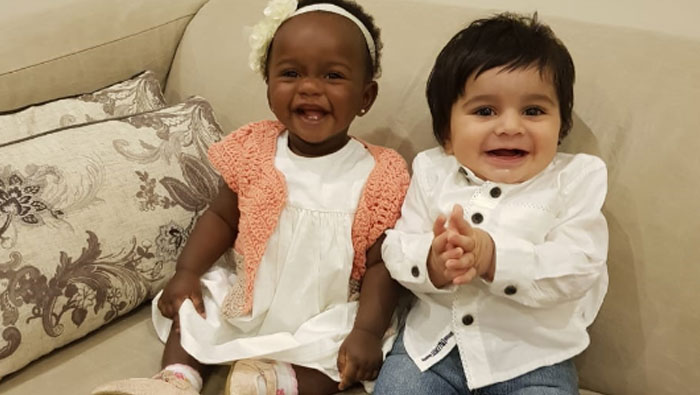
Muscat: Families in Oman adopted 360 children in 2018, giving them hope and a new home, according to the Ministry of Social Development (MoSD).
The number of children adopted in 2018 is higher compared to previous years and has increased over the past three years, suggesting that more people in Oman are choosing to adopt children.
According to the MOSD’s annual report for 2018, 269 children were adopted in 2016, 353 children were adopted in 2017, and 360 were adopted in 2018.
According to the Ministry’s report, more girls than boys were adopted in Oman, with 149 girls and 120 boys adopted in 2016, 207 girls and 146 boys adopted in 2017, and 219 girls and 151 boys adopted in 2018.
According to the Ministry, extensive studies are undertaken before any child is adopted.
An official from the Ministry said, “The relevant authorities at the ministry do social research for families that want to adopt a child. This is to identify how well these families can take care of the child and raise them in a healthy manner and offer them a good life according to the regulatory list for adoption. Of the 360 children adopted in 2018, 146 children were adopted with families that received financial aid from the budget for social security in order to help provide for the child, while 214 children were adopted by families that did not receive aid.”
31-year-old Basmala Al Lawati, was a resident-in-anaesthesia and was in critical care until she had her first child and took a break from her profession. Seven years ago, she helped adopt a young boy into a different family. This led to Basmala and her husband Nabeel adopting a five-month baby named Noor seven months ago.
**media[1061288]**
About the experience, Basmala said: “My husband, I and our families all learned that loving a child is not about blood ties. Hearts can give birth sometimes just like the womb. This is something my friend Ibtisam Al Riyami — the mother of Maisam and Omar — says. Love doesn’t come by giving birth but by being around your child.
“Everyone in the family learned that people of all races and colours are the same (knowing that Noor has a different skin tone from ours),” she added. “The children of the family have been incredibly accepting of Noor and treat her like a biological sister. This showed that children are very far removed from racism or prejudice. The third effect was how close our family became. Adopting a child has made my husband and I more close-knit when it comes to making choices and raising our awareness about adoptees,” she added.
According to Basmala, society is becoming more accepting of adoption. She said: “All societies have challenges and perhaps our Eastern or Arab society is conservative about adoption or may sometimes look down on adopted children, but I personally feel like society can understand adoption if the adopting family is open to questions and to quench the curiosity of others.
“My husband, and I think all adopting families look at the societies around us as an enabler to adoption. If you accept the practice then that helps all families raise children with fewer challenges,” she added. “At first I would answer questions from people sharply because my daughter looks different from me, but I found out that when I accepted that people were curious, their reactions shifted to smiles, awe, and then praise. They sometimes ask why I adopt if I can have biological children, so I explain that adoption is not a replacement, but an addition. In an Islamic society that takes care of everyone, orphanages would be empty.”
Basmala said that she increasingly received less and less surprise towards adoption. What she did receive instead was praise. She also urged other people to adopt, saying: “Of course I encourage it. Adoption is an unlimited well of love. However, you should adopt well and with awareness.”
When asked about her general feeling after adoption, Basmala praised God for his gifts and asked for blessings for her and her children. Only Omanis may adopt children in Oman, according to the Child Law, with the executive list for the Child Law ruling: “A family or woman who request to adopt a child must be Omani and Muslim, must be between 25 and 49 years old, with exceptions given by the undersecretary, they must be free of chronic and infectious diseases, and they must be able to care for the child socially, educationally, and economically. This is proven by the study done by the authority.”
Omani families looking to adopt must also undertake training courses so that they know how to deal with the new family situation. In line with these requirements, Dr Nuhaila Al Rawahi, an educational psychologist in Oman explained that there is more to adoption than simply taking in the child to your house. It is more about the environment that you can provide for them to nurture their growth and happiness.
Al Rawahi told the Times of Oman: “Adoption alone will not affect a child’s learning and education, it is more dependent on whether the child is adopted into a safe and loving home and is raised in a conducive learning environment. Children require an environment that supports their physical, social and emotional, language and communication and cognitive development.
“This means they needs appropriate exposure and opportunities to observe and practice skills. It is crucial that a child develops and reaches all their milestones as these are the foundation blocks,” she added. “I know a few parents who have adopted and they treat all their children the same and have the same overall aspirations for all of them. Their family values are equally applied to all their children.”